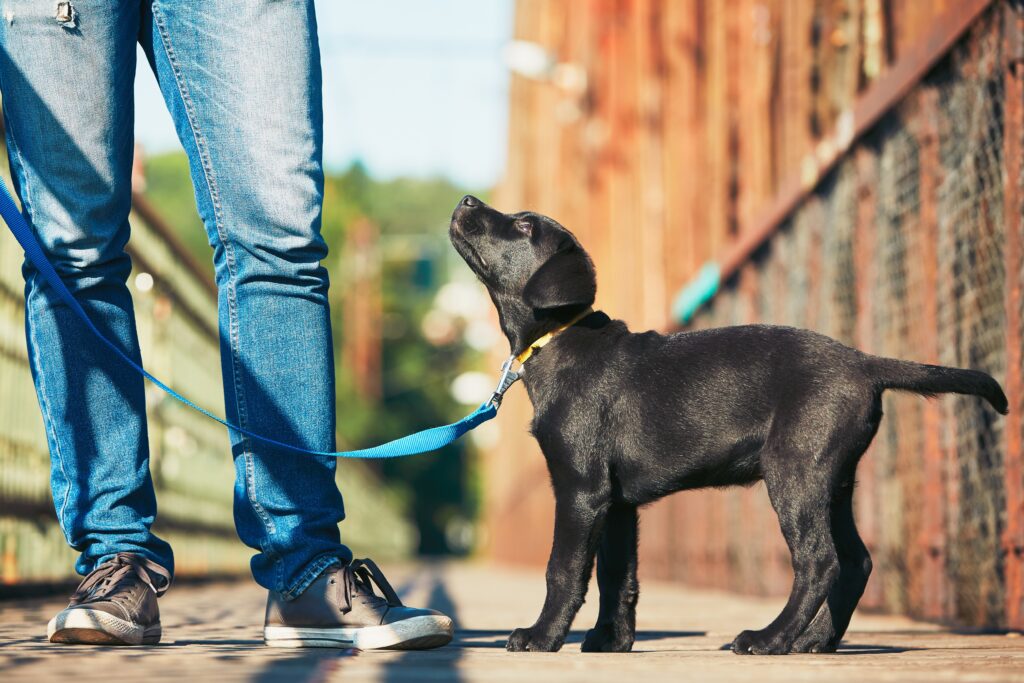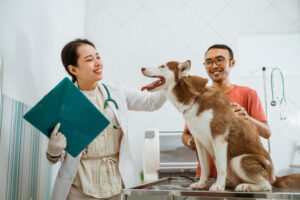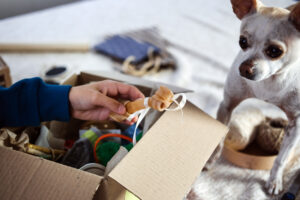Bringing home a puppy is an exciting experience for everyone, including your new pup! They could be overwhelmed with their new environment, so it’s essential to help your puppy feel accustomed to their new home. They’re not going to know what your expectations of them are or what’s normal until you, as the dog owner, set those expectations and create a routine your puppy can understand and follow. WebMD states that it takes about 4-6 months to almost a year for a puppy to be fully house trained, let alone potty trained. Please don’t get discouraged that the process has not been so easy. They’re learning, you’re learning, and eventually, you’ll both get it right! Taking care of a puppy is a learning process, but the bond you’ll have with your pup as they grow up will be a strong and loving one.
Create a Routine
A simple way to house train your dog is by creating a routine that suits your schedules that meets your puppy’s needs. Their routine should consist of plenty of outdoor activity (in the morning as soon as they wake up and every two or so hours). A regular feeding schedule so both you and your pup can anticipate their mealtime. The repetition will be a great way to reinforce your puppy’s memory of when/where they expect to eat, which will eventually coincide with their elimination routine.
Potty Training
Puppies will have accidents, especially if they are very young. Monique Feyrecilde, BA, LVT, VTS (Behavior) of VCA Hospitals said that it takes about 2-4 months for puppies to be able to hold in their “eliminations” (a term that describes urination or defecation of dogs). Dog owners need to encourage appropriate elimination behavior for their dogs. Just like humans, when you have to go, you have to go. Always ensure your puppy is outside frequently so they can alleviate themselves. Accidents happen, but no human enjoys having to hold it in themselves, so make sure you let your puppy go outside often so they can get in the habit of alleviating themselves outdoors. It’s encouraged that you accompany your puppy as they go out to relieve themselves.
When Should You Let Your Puppy Out to Eliminate?
Your puppy’s routine will help you understand when you should let your dog out to eliminate. According to Feyrecilde, these are indicators for when your puppy should be taken outside to eliminate:
- As soon as they wake up for a nap or sleep!
- After their meals or after drank a lot of water
- During the night (especially if they are too young and cannot hold in their eliminations)
- Every 1-2 hours
- After playtime or activities like walking, running
Make sure you accompany your puppy each time they go out to eliminate. Bring your leash so you can make sure your puppy doesn’t runoff. Lead your puppy to the appropriate location you want them to eliminate (such as your backyard lawn, balcony turf, etc.) Familiarize them with the area you want them to eliminate. Over time, they can understand where they can eliminate in or outside the home. Your puppy will need time to know when and where it is appropriate for them to eliminate, but repetition will help them learn. Remember, dogs respond well to praise! So reward them for doing an excellent job by eliminating in the desired place. Don’t punish your puppy for their mistakes! Accidents happen! The goal is to minimize and prevent accidents. Fear won’t help them learn. Don’t forget to always pick up after your puppy!
Types of Potty Training Methods:
What is Crate Training?
Crate Training is a method to confine your puppy to utilize a crate as a den. It sounds like a punishment, but it’s not. Nor should dog owners use their dog’s crates as a punishment either. Puppies can benefit from crate training to prevent accidents when potty training. It’s a great way to account for your puppy when you’re busy in and outside of the home. According to Heather Hoffmann, DVM of PetMD, dogs are den animals and will not urinate or defecate where they sleep. Your puppy won’t associate their crate as a den until they feel comfortable and recognize it as one. As soon as your pup is comfortable in their crate, they will be able to start holding in their eliminations. If crate training goes well, you can take them out of their crate and straight to their potty area for their can eliminate. Crates are an area for your dog to feel comfortable and sleep. The size of the crate is crucial. Your puppy’s crate should be big enough for them to stand in, turn around, and lie down. If your puppy grows larger over time, it’s best to invest in a crate that has dividers. Make sure you make this area a comfortable place for your puppy so that they can feel at home over time. Shannon Sharpe from the American Kennel Club said that crate training takes about six months for dogs to become accustomed to it.
If your puppy has eliminated inside their crate, it could indicate that this may mean they are “too young to hold it in” or are not “getting outside enough.”
What is Paper Training?
Paper Training is a method to leave out sheets of newspaper in a designated area that is easy to clean up (like a wood floor). The dog recognizes that the area covered in newspapers is where your dog can relieve itself. This method is great if you’re not able to take your dog outside but it’s not an alternative to taking your dog on a walk, according to Josie F. Turner for AnimalWised.
Turner encourages dog owners to note where your puppy eliminates and places the newspaper in that area. Over time, you should move the newspaper into the designated area you want your puppy to eliminate. If your puppy eliminates outside of where the newspaper is, it is an indicator that you took the paper away too early. Like always, never punish your dog for their mistakes. Encourage or reward them for each time they eliminate on paper. It will reinforce the behavior in the long run. Like crate training, it will take about six months for your puppy to become accustomed to paper training.



